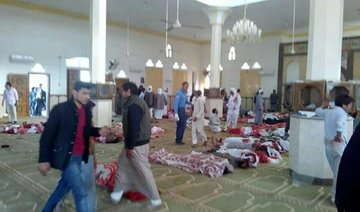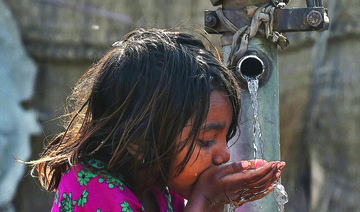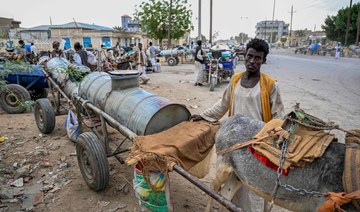CAIRO: Egyptian President Abdel Fattah El-Sisi has given the army and the Interior Ministry three months to restore security in the Sinai Peninsula with freedom to use “all brute force.”
This comes a week after 311 Egyptian worshippers were killed and 128 others injured in a terrorist attack on a mosque in North Sinai during Friday prayers; it was the deadliest terror attack in Egypt’s modern history.
El-Sisi has promised massive development for the Bir Al-Abd area in North Sinai where the attack took place. “We will make Bir Al-Abd a city that is referred to as a model of prosperity and development; we can never allow anyone to do such a thing again to our people,” El-Sisi said on Wednesday morning.
El-Sisi issued his orders in public, addressing the Army Chief of Staff, Mohamed Farid Hegazy, who led the military salute to the president.
The Egyptian president repeated the phrase “brute force” in what appeared to be a response to criticism in a number of foreign newspapers and on social networking sites after the phrase was used last Friday to describe the response to any future terrorist acts.
The uproar prompted presidential spokesman Bassam Radhi to explain that what El-Sisi meant by “brute force” was “the ferocious force that mercilessly oppresses the aggressor, pursues the terrorists, and kills them all.”
Radhi said on Saturday that the incident underscored the despair of the forces of extremism and revealed their ugly face. “The more their strength weakens, the more they want to inflict greater losses because they have been completely routed.”
He stressed that Egypt would avenge the victims of the mosque attack and that the perpetrators of the atrocity would not escape punishment.
No group has claimed responsibility for the Al-Rawdah mosque attack in Bir Al-Abd. The Egyptian public prosecutor’s office, however, said that armed men carrying flags of Daesh opened fire on worshippers inside the mosque and on those who tried to escape after an explosive device was detonated.
Retired Egyptian Air Force Gen. Hesham Al-Halabi, who is now an adviser at Nasser Military Academy, told Arab News that the use of the term “brute force” after terrorist operations against civilian targets confirms that the Egyptian state will not tolerate any groups or terrorist plots that target civilians.
“There are increasing indications that terrorist organizations are directing the bulk of their operations in the current and short term against civilians and civilian institutions in order to push the people of North Sinai to leave their homes and evacuate the area,” Al-Halabi said.
The military expert explained that “brute force” meant the use of maximum force to destroy the terrorist threat completely.
In his speech, El-Sisi stressed that Egypt has been facing a full-fledged war over the past years, waged by what he called “some bodies” to “prevent the progress and prosperity of the state.”
The Egyptian president slammed the ideology of the terrorists: “By what logic can anyone justify the killing of children and the elderly and depriving them of their right to life?” He also asked: “How can those who claim to belong to the religion of Islam, which calls for tolerance, spread destruction on the earth?“
Al-Halabi said: “This increasing shift to targeting civilians comes with the opening of four huge tunnels in June 2018 which will link Sinai with the valley and the delta in an unprecedented way since the Suez Canal was dug.”
“The forces that support terrorism in Egypt want to limit the chances of a huge human shift in the direction of Sinai after the opening of tunnels and the state’s determination to develop the region,” he said.
Al-Halabi explained: “After the failure of the implementation of the Greater Gaza Project in Sinai during the rule of the Muslim Brotherhood in Egypt, that caused some regional and international forces in support of this project to use terrorism as an alternative to exacerbate the situation in North Sinai.”
“The president’s orders to both the army and the police to restore security in the Sinai means that counterterrorism operations in Sinai in the next phase will be mostly joint operations with the primary objective of protecting civilians,” he said.
Al-Halabi said that the restoration of security and stability in the Sinai was not a complete elimination of the terrorist threat, and that any large-scale organized terrorist attacks threatened the security of the population.
“Terrorism cannot be completely prevented anywhere in the world, especially when the regional environment is ready to spread terrorism with the support of some countries in the region,” Al-Halabi said.
Egypt’s state news agency, MENA, reported on Wednesday that Cairo had requested an emergency meeting of the Arab League on Dec. 5 to discuss “ways to strengthen the Arab system to combat terrorism” following the Al-Rawdah mosque attack.


























